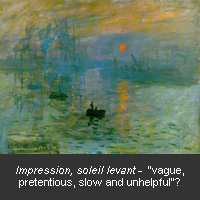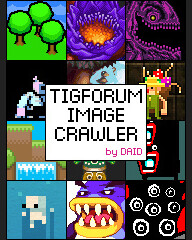To Jim Sterling, Who Hates Art Games
By: Derek Yu
On: February 19th, 2010

Ah, art games, the lightning rod of indie gaming… Jim Sterling (pictured above) recently wrote a couple of inflammatory articles about art games. The first one is titled “Indie games don’t have to act like indie games” and the second one is titled “Art games aren’t innovative and innovation isn’t good”. The headlines are clearly sensationalistic, but Jim does a reasonable job expressing a common view about art games: they’re stupid, boring, pretentious, and not very innovative. If you scroll through the comments on Destructoid, you’ll see many a “Hear, hear, Jimbo! Preach it, brotha!” People are sick of art games.
But Jim and others, here are some important points that I think are missing from these articles (after the jump):
1. Art games are a relatively new concept, and like anything new, they are primitive by default.
2. People do genuinely enjoy these games, and find meaning in them. Even if a player is simply filling in what’s intentionally vague or abstract about the game, that’s valuable. By analogy, there’s value in a cup or a bowl.
3. Jim, you tore apart Edmund and The Marriage, calling them “boring”, “horrible”, and “intellectually lazy”. These are free games made as experiments, as prototypes – the video game equivalents of doodles or sketches, and just as necessary to making games as to making paintings. You railed on two little experimental games for half a dozen paragraphs, and failed to mention that Edmund’s creator, Paul Greasley, also made Zompocalpyse and The Marriage’s creator, Rod Humble, is the executive producer for The Sims (the lazy bastard)!
4. Your argument is the same argument people have used for centuries against artists trying to do new things. Here is what art critic Louis Leroy wrote of one of Claude Monet’s paintings around the dawn of Impressionism (1874):
“A preliminary drawing for a wallpaper pattern is more finished than this seascape.”

Does that sound familiar? He thought it was lazy, sloppy, and unfinished. In fact, it was the start of something entirely new – something that many people couldn’t imagine living without today. (By the way, there are a lot of other parallels between Impressionism and many of these new experimental game movements.)
I actually agree with some of the things you’re saying, like how AAA mainstream games can be innovative, and how games can be artistic without being unfun or pretentious. But with the attitude you took in your articles (fuck this, fuck that, sarcasm), you may be remembered as the Louis Leroy of this generation+. Food for thought.
Art games will always have a place here on the TIGSource front page, and I will never ever tell people to stop making them.
+ (Although, to be fair to Louis, he at least coined the term “Impressionism”.)
-
Lemon Jesus
-
Theotherguy
-
ngajoe
-
http://deepplaid.com/blog IQpierce
-
Mitch
-
http://roachpuppy.com Chris Zamanillo
-
mots
-
AmnEn
-
corpus
-
Omgyiyja
-
corpus
-
Alomard
-
Theotherguy
-
http://www.microwaving.net Alex
-
Lemon Jesus
-
Lemon Jesus
-
Flamebait
-
http://BulletMechanics.com/ Jason
-
Alomard
-
Phillip
-
http://14113.co.uk Adam
-
Strange
-
zeek
-
0rel
-
Omgyiyja
-
Dodger
-
ESPNFAN69BONER
-
kwyjibo
-
Theotherguy
-
Theotherguy
-
Alomard
-
cigarettes
-
DalaranJ
-
johhny
-
Alomard
-
Derek
-
SirNiko
-
Derek
-
falsion
-
AmnEn
-
mary poppins
-
Dodger
-
Derek
-
KC
-
falsion
-
falsion
-
Derek
-
TeamQuiggan
-
Barkwiss
-
alastair

